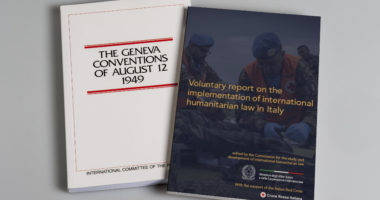Whether they engage in dialogue with belligerent parties or distribute relief to war-afflicted populations across the globe, humanitarian practitioners need to understand the international legal framework governing armed conflict in order to effectively carry out their duties. To meet their expectations, trainers need to tailor programmes according to the very practical requirements of such an audience. Over the last year, the ICRC has experimented with new approaches to teaching international humanitarian law (IHL) to aid workers, based on ‘blended learning’ backed with an ‘inductive methodology’.
The promotion of international humanitarian law (IHL) is part of the ICRC’s core mandate and is an important element of its prevention policy. While all States have the obligation, as a matter of international law, to disseminate the Geneva Conventions, it is to be expected that the ICRC, in its role as ‘guardian’ of the Conventions, will provide as much support in this regard as possible.
The latest installment of ICRC’s new model for teaching IHL to humanitarian practitioners, took place from 6 to 11 November 2016 in Geneva. Thirty senior practitioners from around the world gathered at the ICRC’s headquarters for an intense, week-long training specifically designed to accommodate the requirements of persons working in the field.
The structure and approach of the November course, which aimed at providing participants with a comprehensive overview of IHL, builds on several years of experience in engaging humanitarian practitioners, notably via an annual French-language course and the ICRC Course on IHL for humanitarian practitioners and policy makers in Naivasha, Kenya.
The November course was driven by increasing demand from the field for a high-quality English-language course targeting a global practitioners’ audience organized under the ICRC’s auspices.
Teaching humanitarian law to humanitarians
For obvious reasons, holding an IHL course for practitioners raises challenges considerably different from engaging an academic audience. By ‘practitioners’ we refer to professionals of various careers and academic profiles, whose common denominator is to hold field-based or operational responsibilities, often in armed conflict situations, and who engage directly with persons who are also of concern to the ICRC. They may work for a range of stakeholders as diverse as NGOs, national societies or international organizations, with decision-making duties ranging from protection and monitoring to distribution of relief and humanitarian assistance. Though usually without a legal background themselves, basic knowledge of IHL could prove critical in the context of their deployment. Modern armed conflicts have seen an increasingly important role played by civil society, whether in carrying out protection and assistance work, or reporting on belligerent parties’ respect for the law.
Tailoring IHL courses for this specific audience means, training objectives have to be realistic and should serve two distinct purposes: first, participants should be able to apply general and important aspects of IHL in real-life situations (without necessarily knowing each treaty provision by heart), and second, the course should provide a firm basis upon which those participants who are so interested may further expand their knowledge on their own.
Positive feedback from the participants demonstrated the benefits of using ‘blended learning’ and an ‘inductive methodology’ when teaching often very complex legal issues.
Blended and inductive learning
Experience in working with practitioners has demonstrated the particular advantages of applying two concepts when planning a course, namely blended learning and an inductive methodology.
Blended learning mixes digital and Internet-based teaching tools with traditional classroom activities. For example, participants at the ICRC’s practitioners’ courses are expected to gain a basic grasp of the essentials of the law by completing our IHL e-learning modules prior to the start of the course. When joining the on-site part, they will be able to expand their knowledge by engaging facilitators in vivo on the concrete application of pre-acquired knowledge. Developing the perfect approach to teaching is a long-term activity fraught with challenges, and past experiences are now allowing the ICRC to update and overhaul the modules, including making them more friendly to users with low connectivity and providing a quality off-line version.
Blended learning is not merely important as a method unto itself; it is precisely blended learning that enables the courses to follow an inductive methodology. The inductive approach places participants in concrete situations inspired by ICRC field operations, and work together to understand how the law may provide elements of an answer to a given humanitarian problem, and then formulate general legal theories from these specific observations.
Case studies used by the ICRC are inspired by real-life situations well-known to our colleagues in the field. The case studies are an essential tool for engaging the participants by asking them to resolve specific problems, and most international law courses today will employ them heavily. The specificity of the inductive approach lies in the fact that participants are asked, applying the essential knowledge they had gained from the online modules, to work on a case study before getting additional substance from an expert resource-person. This way, participants have to apply general concepts and understand how they would apply and evolve in specific situations; once group work on the case studies has been concluded, the expert can cover the relevant subject matter and relate it to the case study, providing a debriefing and analysis of the work done by the participants. The idea behind the approach is to develop participants’ legal ’reflexes’, familiarizing them with legal concepts and notions and their application in reality.
The other important point refers to the choice of subject matter experts. While it may be tempting to invite renowned academics to speak at a course, ICRC organizers cannot ignore the specific needs of an audience consisting of practitioners. Accordingly, we strive to invite resource-persons with ample experience in working in the field – experience they may readily share with the participants, and beyond that, based upon which they would certainly be much better positioned to understand the situations participants face.
***
In order to stay up to the challenge of teaching IHL in a manner that should, hopefully, improve the situation of victims of modern armed conflicts, trainers need to take into account not only the specificity of such conflicts (including the growing presence of civil society and international organizations on the ground), but also developments in teaching as such. Training should always be specifically tailored to the needs of the target audience and identify key issues of concern that need to be highlighted when engaging those particular participants. The long-term impact of such activities on the situation in the field is indirect and therefore difficult to measure, but cannot be denied. At any rate, the ICRC’s legal training team stands at the disposal of all of those interested in spreading knowledge of the law.
Additional resources
- Learning & teaching IHL – ICRC’s course offers and more.
- How humanitarians safeguard the law of armed conflict – Raphael Dallaire, 25 October 2016.






Comments